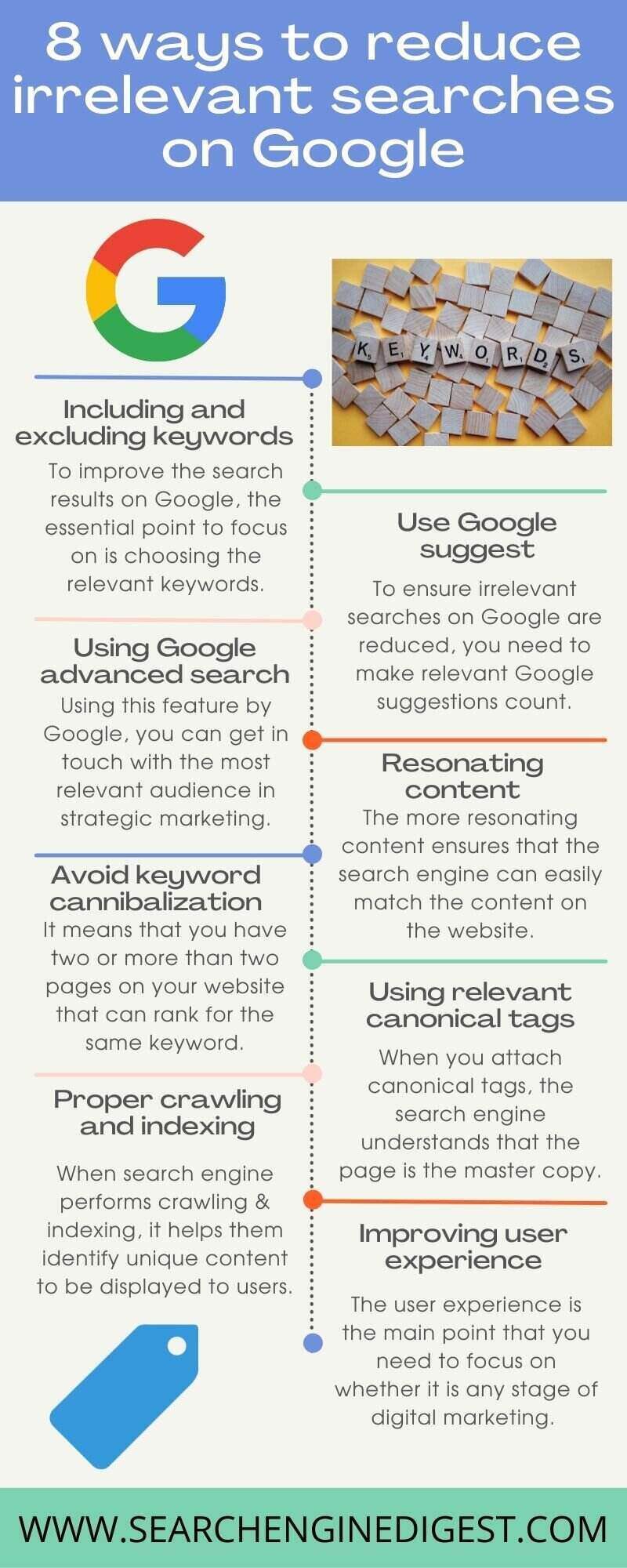Whether buying products, looking for answers to multiple questions, directions to a location, etc., today’s online audience do not waste a second going online. In today’s digital world, the internet is becoming the go-to platform to answer any search query arising in the user’s mind. The most common online platform where users look for these answers is the search engine ‘Google’. Google can be considered as the digital library and provides answers to millions of keywords or search terms entered. As Google search works on algorithms, crawling & indexing, etc., and works on artificial intelligence, irrelevant searches are always possible.
With constant updates on the algorithm, Google now says that it has reduced irrelevant searches by over 50% in the last 7 years. It always remains a challenge for Google SEO or Bing SEO to display the most relevant searches and they constantly keep working on this. In this blog, we will discuss what irrelevant searches are and how Google focuses on reducing them for better overall search results and increases users’ trust in the search engine to increase traffic.
One thing that we can expect from Google is constant change. It is not only for the sake of change itself but instead for improving search quality and relevancy. It means that the bar for ranking your website high in the Google search results continues to be raised, which means that you have increased website visibility, traffic on the website, etc. Ever since the launch of Google, search engine optimization techniques to rank website on the SERPs have evolved significantly. Today, digital marketers continuously focus on following SEO trends, optimizing images, writing great content, etc., to grab users’ attention to their website ahead of competitors. As all these search results appear on Google, the search engine concentrates on reducing irrelevant searches to provide the best user experience and reduce it to a high percentage in the near future.
What is an irrelevant search on Google?
With 5.6 billion searches per day on Google, the largest search engine has multiple business listings and offers answers to a wide variety of user searches. As the Google ranking algorithm keeps updating, the search results are reliable and thus the most searched platform by users. With a considerable number of websites present on Google, there are high chances that the search results match some of the keywords or search terms entered. However, this does not guarantee the point that it will answer all the user search queries with ultimate precision.
Google SEO has a listing of multiple businesses and tries its best to display the best possible results to the user search query. Google bot performs crawling and indexing on various website pages to display the best possible results to ensure that the page displayed to visitors best matches the users’ intent. However, there are instances when they do not meet the user’s expectations and see a reduction in traffic. To keep the users’ interest engaged with the search engine, Google continuously focuses on the best search match results.
Suppose you searched for the best offshore digital marketing services and the results appeared as outsource digital analytics, outsource PPC services, outsource SEO services, etc. However all these branches relate to digital marketing, but it does not match the search on Google. There may be local SEO service providers or PPC experts who handle ad campaigns to deliver the best advertising return on investment. But the user did not search separately for SEO campaigns or PPC ads. The main point was to look for offshore digital marketing services so that all the branches of digital marketing get covered like search engine optimization, search engine marketing, social media marketing like Facebook Ads, LinkedIn Ads, YouTube Ads, etc. and many other points in online marketing. So, this user search query would be considered irrelevant as the user did not get the desired results.
8 ways to reduce irrelevant searches on Google

- Including and excluding keywords – To improve the search results on Google, the essential point to focus on is choosing the relevant keywords. When you search on Google, the artificial intelligence of the search engines at first looks for the target keywords on the listed websites. Google performs multiple tests to rank the website on the search engine results, which include website content, rating & reviews by users, whether the site has an SSL certificate, crawlabilty & indexability of the webpages, whether the website is optimized for mobile devices, page loading speed, user engagement, relevant keywords, structured data, domain authority, etc.
As in PPC ads, you focus on choosing the relevant keywords that best match the users’ search query to avoid your ad budget from getting wasted on the irrelevant clicks; similarly, you need to choose the high traffic relevant keywords so that Google search quickly identifies your website for the keywords or search term entered. Selecting the relevant keywords for your business is essential so that your website appears on the Google search result.
Whether it is Google SEO or Bing SEO, you need to have a clear idea of the keywords that you are listing on your website. All your SEO marketing efforts to rank your website higher on the SERPs rely on improving SEO metrics performance; one of them is choosing the relevant keywords. In PPC advertising, as you focus on writing ad copies and ad descriptions in ad campaigns to attract the users to click on your PPC ads, you also ensure adding negative keywords so that your ad triggers the search queries irrelevant to the product or services that you offer. You need to keep updating the keyword list with changes in the product or services you offer, which sync with the SEO trends. This would help improve the search results on Google. Some of the points that you can focus on when choosing the relevant keywords to improve search on Google are listed below.
-
- Analyzing the user search intent.
- Understanding keyword match type.
- Performing competitor research.
- Focus on users’ buying journey.

- Use Google suggest – When you focus on reducing the irrelevant searches on Google, the next essential point you can focus on is using Google suggest. When you search on Google, you enter the first letters of a keyword or search term and Google suggests other popular keywords which people have used in their previous searches. You can consider using these Google suggestions in your plan & strategy to gain better results.
You can consider adding these suggestions to your list of keywords (if you find them relevant to your business offerings) to broaden your search results for users. To ensure that the irrelevant searches on Google are reduced, you need to make the relevant Google suggestions count in your marketing list so that your search results broaden and your website appears to a wide range of audiences.
Multiple suggestions are shown when you enter a keyword or search term in the Google search bar. Choosing this eases the users’ search query and also, you get to have an idea of what the users are searching for. However, it may not appear relevant for short-term keywords and when the search query is performed on a desktop. But, when it comes to long-tail keywords and the search is performed on mobile devices, it becomes crucial to choose these Google autocomplete suggestions. This saves time in getting the search results as the users do not have to type the keywords. This is why you need to improve the website’s mobile-friendliness so the search result is easily performed. Some of the points that you can focus on by using Google suggest are listed below.
-
- Search volume – When you see multiple results from Google suggest, you get to see that there are results that do not have high search volumes. You need to decide whether they are relevant to your business offerings or not, even if they have a low search volume. However, you may consider excluding the generic keywords in your SEO marketing strategy and increasing traffic with the relevant search results.
- User personalization – The next point to focus on is user personalization. You need to focus on improving user personalization with the help of cookies and identifying how they perform searches.
- Misspellings & variations – There may be users who would be entering the wrong spellings of the search terms. When Google displays the search results suggestions with the correct spelling and variations and the user selects any of the intended search terms, Google does not have to make corrections to the search query displaying ‘did you mean’.
- Using Google advanced search – The next essential point that you need to focus on reducing irrelevant searches is using Google advance search. Using this feature by Google, you can get in touch with the most relevant audience in strategic marketing that has a high chance of taking the intended action.
Google advanced search is a more detailed method of finding information on Google. It encompasses a variety of special characters and commands – also known as “advanced operators”, which is more than a normal search. The advance search can be performed based on multiple factors mentioned below.
-
- Language
- Region
- Site or domain
- Safe search
- Reading level
- Resonating content – The reduce the irrelevant searches, the next point to focus on is using reasoning content. To improve the Google search results, you need to focus on writing content that resonates with the users’ search query. The more resonating content ensures that the search engine can easily match the content on the website and then decide which results to display on top in the SERPs. This helps Google display the most relevant search results based on the users’ search terms entered.
In Google SEO, you work on writing website content, product page descriptions, meta descriptions, headlines, etc., so that the visitor takes the intended action. Even when you perform remarketing competitor research with content marketing, email marketing, etc., you ensure that you have written great content to grab the users’ attention into taking the intended action. Also, when preparing an email marketing list, you concentrate on writing how-to content and focus on the audience persona to make the relevant audience visit your website to take the desired action. This becomes even more essential for businesses dealing in the e-commerce industry as it has a wide range of products and keeps updating with the e-commerce trends. Some of the points that you can focus on reducing irrelevant searches on Google search results are listed below.
-
- Write engaging content.
- Ensure using the primary and secondary keywords.
- Having an eye-catching call to action.

- Avoid keyword cannibalization – After having written resonating content, the next essential point that you need to focus on is avoiding keyword cannibalization. Keyword cannibalization means that you have two or more than two pages on your website that can rank for the same keyword. This is a critical point that matters in search engine optimization as instead of competing with the competitors’ page, the keywords defy themselves to get ranked.
When the search engine works on identifying the page that best matches the users’ search query, it gets confused about which page to display. It happens due to the point that the page ranks for the same keyword. This increases the chances that when a user search query is performed on the Google search results would display irrelevant results. The keyword cannibalization is an important point that needs to be highlighted as this improves the chances of the website ranking. The better the ranking, the better the chances of an improved organic click-through rate, lower bounce rate, etc.
To highlight the keyword cannibalization in Google SEO, you can consider performing an SEO audit that highlights the pages that have multiple keywords. This would also help you know whether there is duplicate content, highlights multiple SEO errors, keyword ranking, link building, etc. and you can use various SEO tools for this. With the proper fixing of the keyword cannibalization issue, you see a decrease in irrelevant search results. Some of the points you can focus on fixing keyword cannibalization issues are listed below.
-
- Choose the most relevant keywords.
- Identify and fix keyword cannibalization on pages that have large content.
- Using relevant canonical tags – The next point that you need to focus on to reduce irrelevant searches on Google is using relevant canonical tags. With the increasing number of websites, the competition to rank higher on the Google search results among marketers is increasing. As Google has a plethora of websites listed to appear on the search result, there are chances that most of the pages do not have canonical tags attached. So, when you attach canonical tags to your pages, the search engine easily understands that the canonicalized page is the master copy of the original content.
When multiple pages are present on a website, you focus on SEO pagination to divide similar sections under a single tab. This makes the user easily navigate through different web page sections and quickly reach the section that the visitor is looking for. It also gives the search engines a chance to display the most authentic search results and avoids any chances of duplicate results.
- Proper crawling and indexing – To reduce irrelevant search results on Google you need to focus on proper indexing crawling & indexing. The search engine must identify the relevant pages to be displayed to the target audience. To do this, you need to ensure that the page can easily be crawled & indexed.
When the search engine performs crawling & indexing to pages on a website, it helps them identify the unique content to be displayed to the users looking for results to the keywords or search terms entered. You need to ensure that your website pages are easily crawlable so that the Googlebot easily performs the crawling process. You can consider adding a robots.txt file so that the search engine understands which pages the crawler can access on your website. This makes it easier for the search engine bot to identify the pages that they need to focus on crawling & indexing.
Since there are thousands of web pages that are produced or updated every day, the crawling process is a never-ending mechanism repeated over and over again. So, at first, you need to ensure that if you have multiple pages on your website, you need to focus on SEO pagination. SEO pagination is an essential point to focus on to ease user navigation on the website so that the users can easily reach the desired section on the page. Whenever a crawler visits a new webpage via a hyperlink, it looks at the content. It works on scanning all the text, visual elements, internal and external links, HTML, CSS or JavaScript files, etc. and then passes the information for processing and indexing. So it becomes essential that you optimize your pages so that Google can crawl the pages on the website. You need to also focus on the point that you add canonical tags so that Google understands that the given page is the master copy and does not consider the content as duplicate.

- Improving user experience – The next essential point to reduce irrelevant searches is focusing on improving the user experience. Whether you work on optimizing images, organizing content on the website, making the website SEO-friendly, designing the website for mobile devices, etc., all these SEO marketing efforts are made to improve the user experience.
The user experience is the main point that you need to focus on whether it is any stage of digital marketing. Be it social media marketing, email marketing, content marketing, building an email marketing list, etc.; all the digital marketing efforts are to ensure that you have an increased user experience. This is done because of the fact that the much better the user experience, the better the chances of the users getting associated with your website. With a proper website optimization strategy, you can drive traffic to your website and also work on retaining the users of your business in the long run. Some of the points you can focus on to enhance the user experience are listed below.
-
- Using relevant call to action.
- Continuously a/b testing to determine which pages the user finds most appealing.
- Implementing responsive web design.
- Tracking what’s working well and what’s not for your website.
What goes wrong with Google searches
- Always testing – To be ahead of the other search engines, Google continuously tests what works the best. In the testing process, the search engine makes changes to the points that are the most relevant search results. In 2018, Google made more than 3200 updates. So, you can understand the point about how many changes the search engines keep practicing. Due to this, the search engines also keep updating their website with the SEO trends. So, when both the search engine and Google update their website and perform tests simultaneously, the chances of irrelevant search results increase.

- Glitches and bugs – Like all technological entities, even Google also endures glitches, bugs, internal server errors, etc. All this affects the performance of the search results to display the relevant search results. Earlier, in 2019, Google had to fix a technical issue that caused pages to be deindexed. Another Google issue caused the search engine to select unrelated canonical URLs that were sometimes reflected in the breadcrumb trails on mobile. So, the search engine continuously focuses on reducing these glitches and fixing the bugs to display the most relevant search results.
- Not 100% accurate – No search engine is perfect. However, as it is just a search engine, so there are always chances that it does not display the relevant results. Google is able to connect the dots for more number of searches more often than not when showing the results for the search terms entered, but due to the irrelevant searches, its accuracy reduces. But, Google has also come to a far distance in building brand awareness and gaining users’ trust to display the most relevant search results.
- Polysemy – The user searches on Google continuously keep evolving with the SEO marketing trends. In the quest to display the most relevant search results, Google often misunderstands the meaning of the search term entered. It happens because the words change their meaning depending on the context in which they are used. For example, if you enter the term ‘fall’, Google may display results with leaves falling from a tree, fall of the kingdom, etc. Without proper explanation, it is hard for a human to give an accurate answer, so imagine how hard it is for the search engine to display the most relevant search result.
Closing thoughts
With so many algorithmic and ranking updates that Google keeps performing, the possibility of irrelevant search results by the search engine is quite normal. However, it has worked a lot on its marketing efforts and reduced the irrelevant results by nearly 50% in the past 7 years. The shortcuts to the success of SEO campaigns are a thing of the past and today; the search engines have multiple methods to display the best results to their users. As you have various SEO tools to perform SEO audit and improve the performance of your website, in the same way, the search engines also have their plan & strategy to show the best matching results. To make your website appear on top for the products or services you offer, you can outsource SEO services to a digital marketing company. The SEO experts here have expertise in local SEO, link building, SEO reports, backlink analysis, etc. Avail of white label SEO services today and see an increase in the return on investment of marketing efforts and have an increased conversion rate.
References
-
306, 2024Understanding Google’s preference for crawling high-quality content
Crawling websites is [...]
-
2905, 2024All you should know about third-party cookies by Google
Cookies have revolutionized [...]
-
2405, 2024Helpful content update by Google to enhance website ranking
Google launched a [...]





Leave A Comment